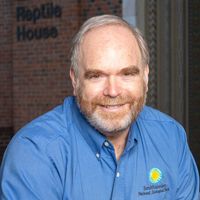Peters, Alan
Former Curator, Reptile Discovery Center
Invertebrate and herpetological animal husbandry supervision; Education program and volunteer development; Cephalopoda culture and behavior; Visitor experience; Exhibit development and design from a curator's perspective.
Background And Education
Education And Training
- M.A.T. Masters of Arts in Teaching, George Washington University
- B.S. in Zoology, University of North Carolina
Professional Biography
-
Alan Peters, Curator of Herpetology at Smithsonian’s National Zoo and Conservation Biology Institute’s Reptile Discovery Center oversees animal care and husbandry, exhibits, research, and staff. He primarily manages and encourages the work of the Homo sapiens within RDC. Peters savors the variety of the nearly 100 species and over 400 specimens of reptiles and amphibians in RDC. He loves working with people and the beauty and complexity of biodiversity.
As nearly half of RDC’s animal collection consists of critically endangered or vulnerable species, Peters and the RDC staff engage in animal management, research and education by focusing on the species requiring conservation. The RDC team applies their husbandry and conservation expertise to global and regional wildlife, ranging from the study and exhibiting of explosive Cuban crocodiles to regional Appalachian salamanders with the primary objective of mitigating extinction.
Peters first volunteered at the National Zoo in 1978. He has served full time at the National Zoo since 1987 and understands the complexities of animal care; staff management; exhibit design, construction, and maintenance; administrative procedures; and cross-department and institutional collaboration. In addition to currently serving in RDC, he has served as Curator of Invertebrates (more than two decades), Small Mammals, hoof stock, Kid's Farm, Lions/Tigers and Bears, Amazonia, American Trail, and Australia.
Alan Peters’ focus has long been two-pronged: (1) help the team to excel in their work and career, and (2) inspire people to be curious, discover, appreciate, and respect their world and its animals. He intends to encourage people to think critically about the Earth’s precious resources and motivate them to conserve and restore ecosystems around the world and at home.
Public Biography
-
Alan Peters, Curator of Herpetology at Smithsonian’s National Zoo and Conservation Biology Institute’s Reptile Discovery Center oversees animal care and husbandry, exhibits, research, and staff. He primarily manages and encourages the work of the Homo sapiens within RDC. Peters savors the variety of the nearly 100 species and over 400 specimens of reptiles and amphibians in RDC. He loves working with people and the beauty and complexity of biodiversity.
As nearly half of RDC’s animal collection consists of critically endangered or vulnerable species, Peters and the RDC staff engage in animal management, research and education by focusing on the species requiring conservation. The RDC team applies husbandry and conservation expertise to global and regional wildlife, ranging from the study and exhibiting of explosive Cuban crocodiles to regional Appalachian salamanders with the primary objective of mitigating extinction.
Peters first volunteered at the National Zoo in 1978. He has served full time at the National Zoo since 1987 and understands the complexities of animal care; staff management; exhibit design, construction, and maintenance; administrative procedures; and cross-department and institutional collaborations. In addition to currently serving in RDC, he has served as Curator of Invertebrates (more than two decades), Small Mammals, hoof stock, Kid's Farm, Lions/Tigers and Bears, Amazonia, American Trail, and Australia.
Alan Peters’ focus has long been two-pronged: (1) help the team to excel in their work and career, and (2) inspire people to be curious, discover, appreciate, and respect their world and its animals. He intends to encourage people to think critically about the Earth’s precious resources and motivate them to conserve and restore ecosystems around the world and at home.
Publications
Selected Publications
-
Article
- Kawano, Sandy M., Martin, Johnson, Medina, Joshua, Doherty, Conor, Zheng, Gary, Hsiao, Emma, Evans, Matthew J., de Queiroz, Kevin, Pyron, R. A., Huie, Jonathan M., Lima, Riley, Langan, Esther M., Peters, Alan, and Irschick, Duncan J. 2024. "Applying 3D Models of Giant Salamanders to Explore Form-function Relationships in Early Digit-bearing Tetrapods." Integrative And Comparative Biology, https://doi.org/10.1093/icb/icae129. 2024
- Anderson, Kailey B., Steeil, James C., Neiffer, Donald L., Evans, Matt, Peters, Alan, Allender, Matthew C., and Cartoceti, Andrew N. 2021. "Retrospective Review of Ophidiomycosis (Ophidiomyces Ophiodiicola) at the Smithsonian's National Zoological Park (1983-2017)." Journal of Zoo and Wildlife Medicine, 52, (3) 997–1002. https://doi.org/10.1638/2020-0213. 2021
- Augustine, Lauren, Miller, Kyle, Peters, Alan, Franklin, Ashley D., Steinbeiser, Cathleen M., Brown, Janine L., and Prado, Natalia A. 2020. "Impacts of the season and reproductive status on fecal reproductive and adrenocortical steroid metabolites in zoo Cuban crocodiles ( Crocodylus rhombifer )." Zoo biology, https://doi.org/10.1002/zoo.21559. 2020
- Miller, Kyle L., Castañeda Rico, Susette, Muletz-Wolz, Carly, Campana, Michael G., McInerney, Nancy, Augustine, Lauren, Frere, Celine, Peters, Alan M., and Fleischer, Robert C. 2019. "Parthenogenesis in a captive Asian water dragon (Physignathus cocincinus) identified with novel microsatellites." PLOS ONE, 14, (6) 1–8. https://doi.org/10.1371/journal.pone.0217489. 2019
- Steeil, James C., Hope, Katharine L., Evans, Matthew, Peters, Alan, and Cartoceti, Andrew. 2018. "Multifocal Ophidiomyces ophiodiicola Infection in an Eastern Diamondback Rattlesnake (Crotalus adamanteus) without the Presence of Skin Lesions." Journal of Herpetological Medicine and Surgery, 28, (3-4) 76–80. https://doi.org/10.5818/18-02-146.1. 2018
- Moini, Mehdi, O'Halloran, Aoife, Peters, Alan M., France, Christine A. M., Vicenzi, Edward P., DeWitt, Tamsen G., Langan, Esther, Walsh, Tim, and Speakman, Robert J. 2014. "Understanding irregular shell formation of Nautilus in aquaria: Chemical composition and structural analysis." Zoo biology, 33, (4) 285–294. https://doi.org/10.1002/zoo.21132. 2014
